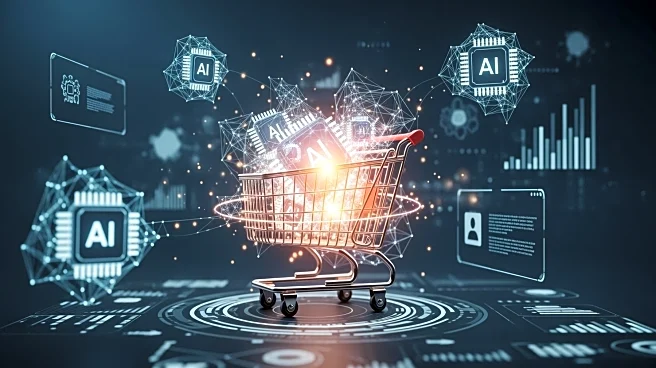What's Happening?
Several ecommerce platforms have launched new AI-powered tools aimed at improving the shopping experience for both merchants and consumers. GoDaddy has expanded its digital ads feature on the Airo platform to multiple English-language markets, allowing
entrepreneurs to create and manage ad campaigns efficiently. Visa has introduced the Trusted Agent Protocol to facilitate secure transactions between AI agents and merchants, addressing consumer challenges in ecommerce. Adobe has released AI agents for B2B sales and marketing, enhancing decision-making processes through engagement insights. Intuit Mailchimp has unveiled new marketing tools for better Shopify integration and advanced analytics. Commercetools has previewed Cora, an AI shopping companion that offers continuity across various channels. Walmart has partnered with OpenAI to integrate ChatGPT for shopping experiences, while Veho has expanded its delivery capacity in U.S. markets. Checkout.com launched Flow Remember Me for one-click payments, and Shippo integrated with TikTok Shop for streamlined shipping processes.
Why It's Important?
The introduction of AI tools in ecommerce signifies a shift towards more personalized and efficient shopping experiences. These innovations are likely to benefit merchants by streamlining operations and enhancing customer engagement, potentially leading to increased sales and customer loyalty. For consumers, AI tools promise a more seamless and secure shopping experience, reducing the complexity of transactions and improving satisfaction. The expansion of delivery capacities and integration with popular platforms like TikTok Shop further indicates a growing trend towards convenience and speed in ecommerce. As these technologies become more widespread, they could reshape the competitive landscape, with businesses that adopt AI tools gaining a significant advantage over those that do not.
What's Next?
As AI tools continue to evolve, ecommerce platforms may further integrate these technologies to enhance user experience and operational efficiency. The partnership between Walmart and OpenAI suggests a potential increase in AI-driven shopping experiences, which could lead to broader adoption across the retail sector. Additionally, the expansion of delivery services by platforms like Veho indicates a focus on improving logistics and customer satisfaction. Companies may also explore new markets and collaborations to leverage AI capabilities, potentially leading to more innovative solutions in ecommerce. Stakeholders, including merchants and consumers, will likely monitor these developments closely to assess their impact on the industry.
Beyond the Headlines
The integration of AI in ecommerce raises questions about data privacy and security, as these tools often rely on consumer data to function effectively. Ensuring that AI agents operate within ethical guidelines and protect user information will be crucial for maintaining consumer trust. Additionally, the rise of AI-driven commerce could lead to shifts in employment patterns, as automation may reduce the need for certain roles while creating demand for new skill sets. The long-term implications of these technologies on consumer behavior and market dynamics remain to be seen, but they could potentially lead to more personalized and efficient shopping experiences.
















